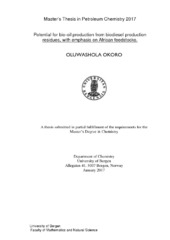| dc.contributor.author | Okoro, Oluwashola Aderemi | |
| dc.date.accessioned | 2017-05-15T15:39:35Z | |
| dc.date.available | 2017-05-15T15:39:35Z | |
| dc.date.issued | 2017-01-30 | |
| dc.date.submitted | 2017-01-30 | eng |
| dc.identifier.uri | https://hdl.handle.net/1956/15851 | |
| dc.description.abstract | Utilization of waste products from biomass have been scarcely research on. These wastes have been a major environmental hazard which involves a lot of capital and effort to curb. Thermochemical conversion using the LtL method is one way of producing marketable biofuels and bio based chemicals from these wastes. This project focus on using this method to convert residual biomass to a useful product for its sustainability. Three materials which are bagasse, eucalyptus and jatropha residues were studied. The solvent used was water and formic acid as the hydrogen donor. There was variation of temperature from 320 to 380oC with heating time of 2-4hrs. GC-MS (gas chromatography and mass spectrometer) was used to analyze the samples. Analysis of these samples shows an approximate 58%wt of bio oil could be produced from eucalyptus and 45%wt and 35%wt from bagasse and jatropha residue respectively. Some of the chemical compounds generated which are furan, guaiacol, catechol and hydroquinone are useful chemicals in pharmaceutical and petrochemical industries. | en_US |
| dc.format.extent | 1974981 bytes | eng |
| dc.format.mimetype | application/pdf | eng |
| dc.language.iso | eng | eng |
| dc.publisher | The University of Bergen | en_US |
| dc.subject | Biomass | eng |
| dc.subject | biofuels | eng |
| dc.subject | bagasse | eng |
| dc.subject | eucalyptus | eng |
| dc.subject | jatropha | eng |
| dc.subject | residues | eng |
| dc.title | Potential for bio-oil production from biodiesel production residues, with emphasis on African feedstocks | en_US |
| dc.type | Master thesis | |
| dc.rights.holder | Copyright the Author. All rights reserved | en_US |
| dc.description.localcode | MAMN-KJEM | |
| dc.description.localcode | KJEM399 | |
| dc.subject.nus | 752299 | eng |
| fs.subjectcode | KJEM399 | |
